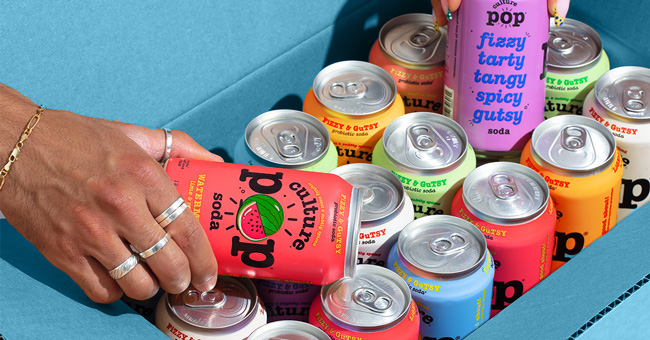Two-and-a-half years after a quiet soft launch in its backyard of Boston, probiotic soda maker Culture Pop is preparing to make its name as a national player in the fast emerging functional soda category next year.
Founded in 2020 by a team of industry veterans – including Nantucket Nectars founder Tom First, The Guard Agency founder Andrew Guard and ROOK/NYC founder and creative director Mark Christou – Culture Pop produces a line of better-for-you, gut health friendly sodas sold primarily in independent, natural and conventional grocery accounts in the Northeast.
Speaking with BevNET last week, First said Culture Pop is sold in roughly 2,000 stores, primarily in the Northeast with select accounts throughout the country, and the company is now looking to double that footprint next year. It is currently available in seven divisions of Whole Foods, and First said the brand will expand chainwide with eight SKUs in the retailer in Q1 2023.
In New York, Culture Pop is distributed through DSD house Big Geyser, which First said has helped the brand to “grow like crazy” in the metro area. The company is also working to bring on new distribution partners around the country to accelerate growth and service new retail partners like Kroger, Albertsons/Safeway, Meijer, Harris Teeter and Hannafords, among others.
The brand’s line of better-for-you sodas debuted with four flavors: Ginger Lemon & Turmeric, Orange Mango Chili & Lime, Watermelon Lime & Rosemary and Wild Berry & Peppercorn. Since then, it has introduced three additional varieties, first with Pink Grapefruit Ginger & Juniper, while Strawberry & Rhubarb and Lemon Lime & Cardamom arrived earlier this year. An unspecified eighth flavor is set to launch in the near future.
Culture Pop’s sodas are shelf-stable and available in 4-packs, but First said single can sales are the primary trial driver. He noted that single can sales tend to improve in accounts that also carry the multipacks, and as the company grows larger pack sizes are in consideration for future innovation.
“I think that I’ve said it a million times, but consumers love carbonation,” First said. “Bubbles create a drink experience for people and brings complexity to our product and depths to flavors. That’s why carbonation has always been really strong … and that’s really appealing to the consumer. So I think the category is strong, and when you add our functionality to that, I think that’s a pretty powerful opportunity.”
Online sales are also taking off, despite a lack of investment into ecommerce until six months ago, First said. Culture Pop is currently available on Amazon and direct-to-consumer, but while the company is putting more weight behind ecommerce, he said the focus for the immediate future remains brick and mortar.
Having founded Nantucket Nectars in 1985, First had long left the trenches of CPG brand building, instead working in other areas of the industry. He owned natural food store Concord Provision from 2001 to 2014 and also worked with brands from the investment side at First Beverage Group and TF Ventures. So when Culture Pop first launched with barely two dozen local independent stores in Boston, First said it marked a nostalgic return to startup mode for him, going up and down the street personally hand-delivering cases to customers. But even with decades of experience guiding the strategy, First said he’s still surprised by how fast Culture Pop has grown.
“It’s incredible to me that we’ve only been at it for two and a half years, and how much the business has grown,” First said. “I didn’t really think it would happen this quickly, but it’s a great category, and definitely a great brand. I think everywhere we put it, it performs well, which is pretty exciting. It’s hard to have that happen with any product.”
Culture Pop’s team consists of 21 full time employees as of this month, he said, and the company is looking to add new sales and marketing positions next year, particularly on the West Coast.
First attributed much of the company’s rapid success to the strength of the functional soda category, which has maintained strong momentum led by prebiotic brands like Olipop and Poppi. While the category has witnessed an influx of recent innovations also targeting low sugar and gut health benefits – from newer names like Brooklyn Cannery and Vina to established brands in other categories like REBBL, Humm and others – First said he believes Culture Pop is differentiated thanks to its use of probiotics, which are more broadly understood by consumers than prebiotics, clean label ingredients and unique botanical forward flavors.
While competitors Olipop and Poppi have been particularly successful with younger shoppers, First said that Culture Pop is performing well with older consumers with an even split between men and women. The rising tide of the category and unique positions of the top selling brands has encouraged more retailers to craft functional soda sets, he added.
“These functional brands that have entered the marketplace have brought a modern perspective on carbonated drinks with real functionality, and they’re bringing consumers into that [soda] aisle,” he said. “So the more the brands perform, the more we hear retailers talking about functional soda and the importance of having a set in the store for that consumer.”

